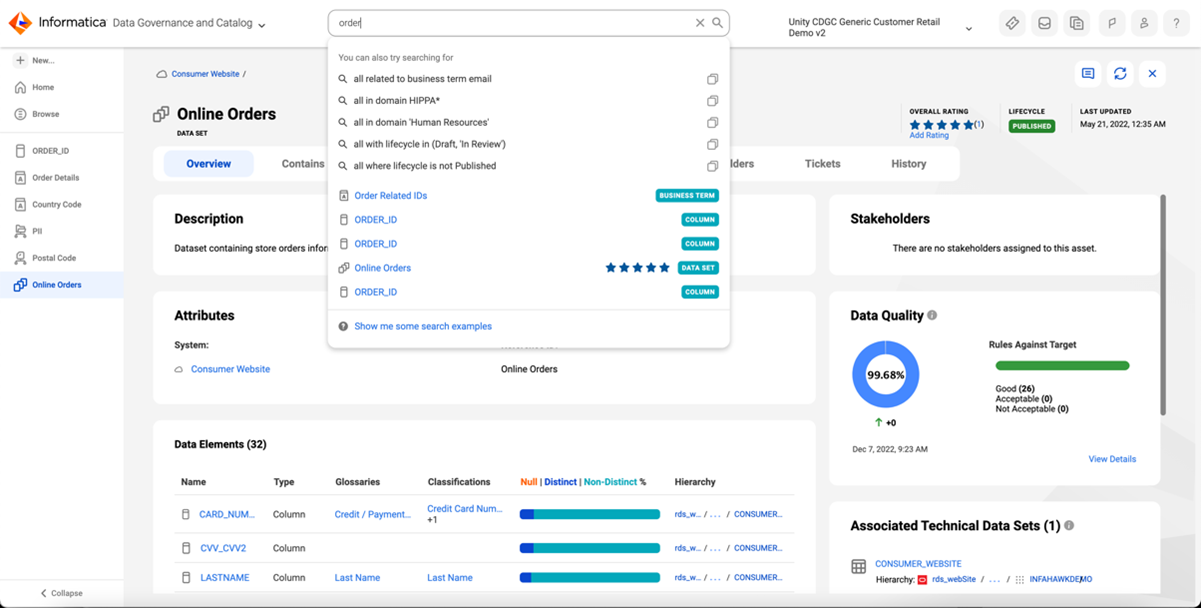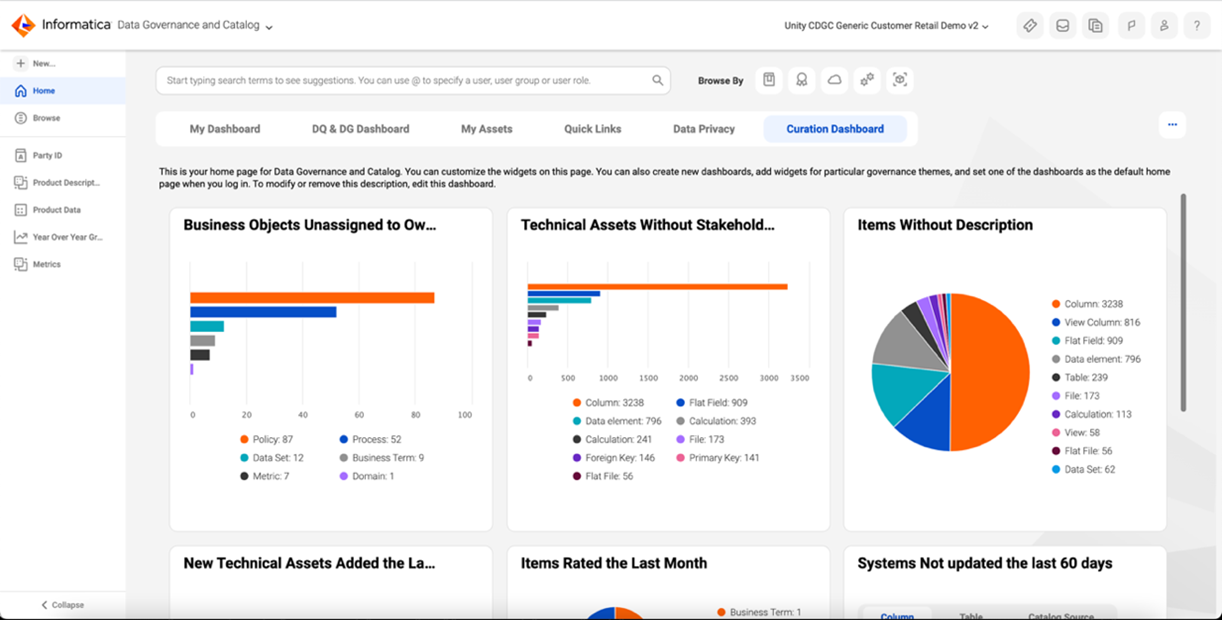How You Can Build a Better Business Case for Cloud Data Governance
The business benefits of cloud data governance are huge, but they’re not obvious. Read this white paper to learn how to make a solid business case for better data governance.
Modern organizations understand that data is critical to achieving their goals and improving business outcomes. So why do so many organizations miss out on significant opportunities to become more innovative, efficient and productive? One big reason: their data consumers cannot find, understand or trust potentially valuable data.
And why is that happening? Here are some of the reasons:
- Data is undiscovered
- Data is not well-understood
- The quality of the data is poor
- The data is misused, often as a result of poor data management and data governance
Communicating the Value of Better Data Governance
While the benefits of data governance solutions are significant, they are not always obvious. CDOs and other data leaders who want to foster a supportive and involved community and data-driven culture must communicate the value of those opportunities to stakeholders.
One effective way to demonstrate the value of improved data governance is through a Business Value Assessment (BVA). This assessment, also known as an ROI analysis or business case, uses numerous examples of successful data governance to showcase how a company can benefit. BVAs are commonly used to evaluate costs, benefits and risks, allowing companies to make informed decisions regarding their financial resources, especially when cash is limited.
With that in mind, let’s look at a business value assessment (BVA) for data governance, illustrating five opportunities on how a company would benefit:
1. Improved Productivity of Data Governance Team
Data governance teams oversee the management of their organization’s data assets. Some of the teams’ duties may include documenting and controlling data sets to help ensure data is fit for business use. Although they can use manual spreadsheets or other repositories to perform these tasks, there are several drawbacks to this approach:
- The tools are typically siloed
- They do not offer the transparency needed
- The approach is not scalable
As a result, teams that rely on these types of manual tools cannot make business-critical, data-driven decisions quickly.
A solution that offers capabilities such as AI-powered data classification and curation, data quality and end-to-end data lineage across the organization’s data landscape would allow these teams to be more efficient and productive by effectively scaling their data governance efforts.
2. Reduced Effort by Data Consumers Searching for and Interpreting Business Data
It’s not uncommon for data consumers to spend significant time trying to find the data they need. Then once they locate the data, they spend hours trying to understand it — attempting to find the answers to questions like:
- What is the source of the data?
- What does the data represent?
- How has this data been transformed?
- Can we trust this data?
A robust data governance solution with an integrated data catalog uses advanced semantic search and browsing. Data consumers can spend less time finding the data they need. Data governance solutions — offering capabilities like data classification, data glossary, data lineage and data asset certification — can help data consumers quickly find the data they’re looking for. When data consumers have the context and transparency they need to understand and trust the data, they can use it with confidence.

Data governance and catalog tools help you find trusted data quickly
3. Reduced Effort by Data Specialists Responding to Requests and Emergency Data Issues
More data consumers at all levels of the organization want to use data to support various business initiatives. Some need access to specific datasets to run analytics, while others wish to access data to create better customer experiences. But this can create an issue for IT departments, who must keep up with fulfilling access requests and working through technical issues. And that means that IT professionals are manually provisioning data for multiple requests instead of focusing on higher-value work. It also means that data consumers must wait until they can access the data they need, which reduces overall productivity.
An automated, self-service solution efficiently provides data consumers with the data and context they need for data-driven decision-making and reduces the number and frequency of requests for IT.
4. Faster Time-to-Value for Data-Intensive Acquisitions and Projects
As I mentioned above, data consumers at many organizations spend much time and effort finding the data they need to support business-critical projects. These kinds of delays extend project timelines and ultimately increase project costs. Additionally, data stewards may spend a significant amount of time inventorying and curating data so that it can be found and used by data consumers to use for these projects.
Automating mundane, tedious data management tasks can significantly accelerate time-to-value for data-intensive projects. Modern solutions can automate and augment scanning relevant metadata across the enterprise; classifying data assets; associating data glossary terms to technical assets; data profiling and cleansing; mapping data lineage and more.
Cloud-native solutions accelerate project time-to-value by allowing organizations to get started quickly by eliminating deployment and infrastructure management.

Informatica data governance and catalog dashboard example
5. Reduced Expected Exposure from Compliance or Breach Event
Regulatory noncompliance and breach events can be costly. At a minimum, a company risks fines and damage to its reputation. The risk exposure for these instances is higher for organizations with siloed data assets spread widely across the enterprise. Data consumers throughout the company can find it challenging to locate sensitive data, such as personally identifiable information (PII) or intellectual property (IP).
AI-powered data discovery and sensitive data classification/tagging within a comprehensive data governance solution can significantly help mitigate risk exposure by helping organizations control their data assets and ensure they are used responsibly.
Informatica Cloud Data Governance and Catalog: Your Foundation for Data Intelligence
But there is good news for organizations who want to do more with their data. Solutions like Informatica Cloud Data Governance and Catalog, a service of the Intelligent Data Management Cloud (IDMC), can help you make impactful, data-informed decisions that drive successful business outcomes.
Informatica Cloud Data Governance and Catalog automates data intelligence and insights to enable self-service analytics and data governance. The IDMC service unifies the capabilities of data discovery, data lineage, data profiling, data quality, business glossary creation, social curation, stakeholder management and policy management and the ability to document and manage AI models and their implementations.
Cloud Data Governance and Catalog allows organizations to efficiently provide users with the business context needed by data consumers by delivering automated and recommendation-driven data classification, data curation, relationship discovery and sensitive data discovery powered by Informatica’s CLAIRE® AI and machine learning (ML) engine.
Learn to Calculate the ROI of Cloud Data Governance
If you’d like to read more about how to build the business case for cloud data governance or learn how to calculate the ROI of effective data governance, download our white paper: 5 Essential Business Value Metrics to Build a Robust Case for Cloud Data Governance









